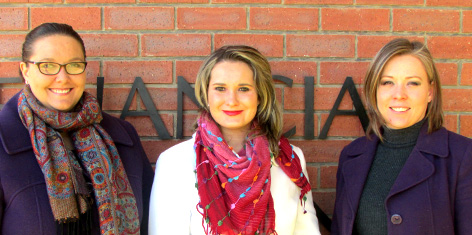Latest News Archive
Please select Category, Year, and then Month to display items
09 November 2018
|
Story Charlene Stanley
|
Photo Charlene Stanley
 Dr Tseliso Ntili, HOD of the Free State Department of Water and Sanitation, warns that pollution caused by mismanagement of municipal water-treatment works puts severe pressure on the province’s water security.
Dr Tseliso Ntili, HOD of the Free State Department of Water and Sanitation, warns that pollution caused by mismanagement of municipal water-treatment works puts severe pressure on the province’s water security.
“Despite our water challenges, Bloemfontein will never become a second Cape Town.” This firm assurance was given by Dr Tseliso Ntili, HOD of the Free State Department of Water and Sanitation, during his presentation at the recent regional seminar of the Faculty of Law’s Environmental Law Association.
The theme of the seminar was Water Quality and Water Security in Bloemfontein and was attended by staff and students from the Faculty of Law and the Faculty of Natural and Agricultural Sciences, as well as relevant role players from private, business, and government sectors.
Not enough water for city’s needs
Water restrictions in some form do seem to remain part of our future landscape though, as Dr Ntsili explained that the city’s current water yield of 218 megalitres per day still fell short of the demand of 259 megalitres per day.
Pollution and mismanagement at municipal level
He pointed out that a big cause for concern was that 75% of the Free State’s waste-water treatment works were dysfunctional. Housekeeping and security at these plants are often severely neglected. Yet, it is difficult for the Department of Water and Sanitation to act against offending municipalities.
“In intra-governmental disputes, the courts must be satisfied that organs of state have taken all reasonable steps to settle contentions – which can be a time-consuming process,” he explained.
Dr Ntsili said that the Caledon River System’s dwindling water levels due to low rainfall and siltation was also a concern, but that plans were underway to supplement the water supply to Bloemfontein via the Gariep Dam by 2026.
However, he warned that poor water management could drastically affect these long-term plans.
“If we can’t manage pollution, the cost will be high. Water security will be challenged, and we will have water shortages – not because of drought, but because of negligence.”
Centre for Financial Planning Law and INSETA making a difference
2014-07-16

The Centre for Financial Planning Law (CFPL) in the Faculty of Law at the University of the Free State and the Insurance Sector Education and Training Authority (INSETA) has established a hugely-beneficial collaboration. Due to this partnership, students at CFPL has access to bursaries of R950 000. These bursaries are available to students studying towards a undergraduate BIuris degree, a postgraduate diploma in Financial Planning, or an advanced postgraduate diploma in Financial Planning.
The CFPL handles the recruitment and selection process for the bursary fund, which will cover up to R68 040.95 for tuition, accommodation and book fees. In addition, the bursaries also cover other fees such as equipment and registration.
According to Shirly Hyland, Director of the Centre for Financial Planning Law, the centre recognises the financial strain some students undergo. The bursaries will therefor enable many of these students – who considered discontinuing their studies because of financial constraints – to continue studying, making a tremendous difference in their lives.